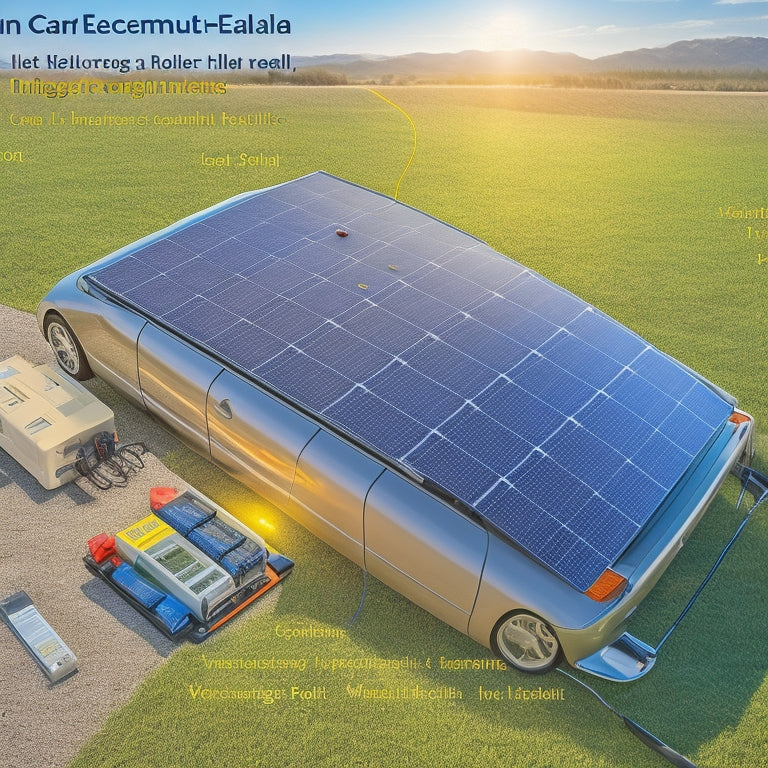
What to Look for in Car Solar Panel Kits
Share
When shopping for a car solar panel kit, you'll want to make sure it has a high-efficiency solar panel with durable design, suitable cable length, and a compatible battery type. The inverter size will determine the maximum power output. Look for a kit with a high power output and efficiency rating, as well as durable construction with UV protection and moisture ingress prevention. A DIY-friendly design with clear instructions is also essential. Additionally, consider the kit's compatibility with your vehicle's system and flexible mounting options. As you weigh your options, consider these key factors to find the perfect kit for your needs, and discover how they impact performance.
Key Takeaways
• Look for high-efficiency solar panels with durable designs that can withstand harsh conditions.
• Consider the power output and efficiency rating to ensure it meets your energy needs.
• Ensure the kit is easy to install with DIY-friendly designs, clear instructions, and minimal tool requirements.
• Check for compatibility with your vehicle's system and versatile mounting options for optimal placement.
• Review the kit's durability features, such as UV protection, moisture ingress prevention, and IP rating, to ensure longevity.
Key Components of the Kit
Your car solar panel kit typically includes a set of essential components that work together to provide a reliable source of renewable energy while on the go. When selecting a kit, it's important to take into account the quality of each component to guarantee excellent performance.
The solar panel itself is a critical element, and its quality can greatly impact the kit's overall efficiency. Look for panels with high-efficiency cells and a durable design that can withstand harsh outdoor conditions. The cable length is another important factor, as it determines the flexibility of your setup. A longer cable provides more versatility in terms of panel placement, but may also increase the risk of energy loss.
The battery type is also a key component, as it affects the overall storage capacity and lifespan of your system. Deep cycle batteries are ideal for off-grid systems, as they can handle frequent charging and discharging. The inverter size is also essential, as it determines the maximum power output of your system.
Power Output and Efficiency
When evaluating car solar panel kits, you'll typically find that the power output is measured in watts, and the efficiency rating is expressed as a percentage, indicating the proportion of sunlight that's converted into usable electricity. The higher the wattage, the more power your kit can generate. However, it's crucial to take into account the efficiency rating, as it significantly impacts the kit's overall performance.
A higher efficiency rating means more energy is harnessed from the sun, resulting in a faster charging time.
As you explore different kits, keep an eye out for the cell temperature coefficient, which affects the panel's efficiency. A lower temperature coefficient ensures the kit performs better in high-temperature environments. Additionally, look for kits with high energy conversion rates, as this indicates a more efficient energy conversion process.
When comparing kits, prioritize those with higher efficiency ratings and lower temperature coefficients for top performance. By doing so, you'll be able to tap into the sun's energy more effectively, keeping your devices charged on the go.
Durability and Weather Resistance
Rugged outdoor environments and harsh weather conditions can severely impact the performance and lifespan of your car solar panel kit, making durability and weather resistance essential elements to take into account during your selection process. You'll want a kit that can withstand the elements, from scorching sun to torrential rain.
Look for panels with UV protection, which will prevent the sun's rays from degrading the panel's performance over time. A good kit should also be designed to prevent moisture ingress, guaranteeing that water doesn't seep into the panel's electrical components and cause damage.
When evaluating durability, check the kit's IP (Ingress Protection) rating, which measures its resistance to solid objects and water. A higher IP rating indicates a more resilient kit. Additionally, consider the materials used in the kit's construction. Aluminum frames, for example, are more sturdy than plastic ones.
Ease of Installation Process
With a durable and weather-resistant car solar panel kit in hand, you'll want to make sure it's also easy to install and set up, so you can get back on the road quickly. After all, who wants to spend hours wrestling with complicated instructions and obscure tools?
When evaluating a car solar panel kit, look for DIY friendliness - you want a kit that's designed with the average person in mind, not just a team of expert technicians. Check the manufacturer's instructions and online resources; are they clear, concise, and easy to follow? Do they provide video tutorials or step-by-step guides?
Additionally, consider the tool requirements. Does the kit come with the necessary tools, or will you need to invest in a separate toolkit? A good car solar panel kit should be designed with ease of installation in mind, minimizing the need for specialized tools and expertise.
Compatibility and Mounting Options
You'll need a car solar panel kit that seamlessly integrates with your vehicle's existing electrical system. Look for kits that offer versatile mounting options and are compatible with a range of battery types and sizes. This guarantees a trouble-free installation process and peak performance.
When it comes to mounting options, consider kits that offer adjustable panel angles. This feature allows you to fine-tune the position for maximum energy harvesting. A good kit should also provide flexible cable management solutions, keeping your vehicle's interior clutter-free and organized.
Be sure to check the kit's compatibility with your vehicle's electrical system, including the type of battery and charging system. A kit that's compatible with a range of battery types and sizes will provide the flexibility you need to upgrade or modify your system in the future.
Frequently Asked Questions
Can Car Solar Panels Be Used for Homes or RVS as Well?
You're wondering if car solar panels can power your off-grid home, eco-friendly RV, or sustainable cabin? Yes, they can! These panels are versatile, perfect for alternative energy in rural living, and can be adapted for various uses.
How Long Does It Take to Recharge a Completely Dead Battery?
"When you're stuck with a completely dead battery, you're probably wondering how long till you're back on the road. The charging time depends on your battery's lifespan, but on average, a 100W solar panel can recharge a 50Ah battery in around 5-7 hours."
Are Car Solar Panels Affected by Shade or Cloudy Weather?
You'll notice that your car solar panel's Cloudy Performance takes a hit, and its Shade Tolerance is put to the test when the sun's hiding behind clouds or trees, reducing its energy output, but don't worry, it's not a total eclipse!
Can I Use Multiple Solar Panels to Increase Power Output?
You can definitely connect multiple solar panels to boost power output, but be aware that panel efficiency will decrease as the system gets more complex, so calculate the power boost carefully to avoid efficiency losses.
Do Car Solar Panels Come With a Warranty or Guarantee?
"When buying car solar panels, you'll want to check if they come with a warranty or guarantee, which typically depends on the manufacturer's reputation and ranges from 1-5 years, offering peace of mind for your investment."
Related Posts
-

What Are the Best Green Vehicle Product Platforms?
You're in the market for eco-friendly vehicles and wondering which platforms cater to your sustainable lifestyle. Top...
-

What Makes Eco-Friendly Car Batteries a Smart Choice?
You're considering eco-friendly car batteries, and for good reason. They offer a trifecta of benefits that make them ...
-

Charging On-The-Go: Portable Battery Solutions Online
You're always on the move, and your devices need to keep up - that's why having a reliable portable battery solution ...


